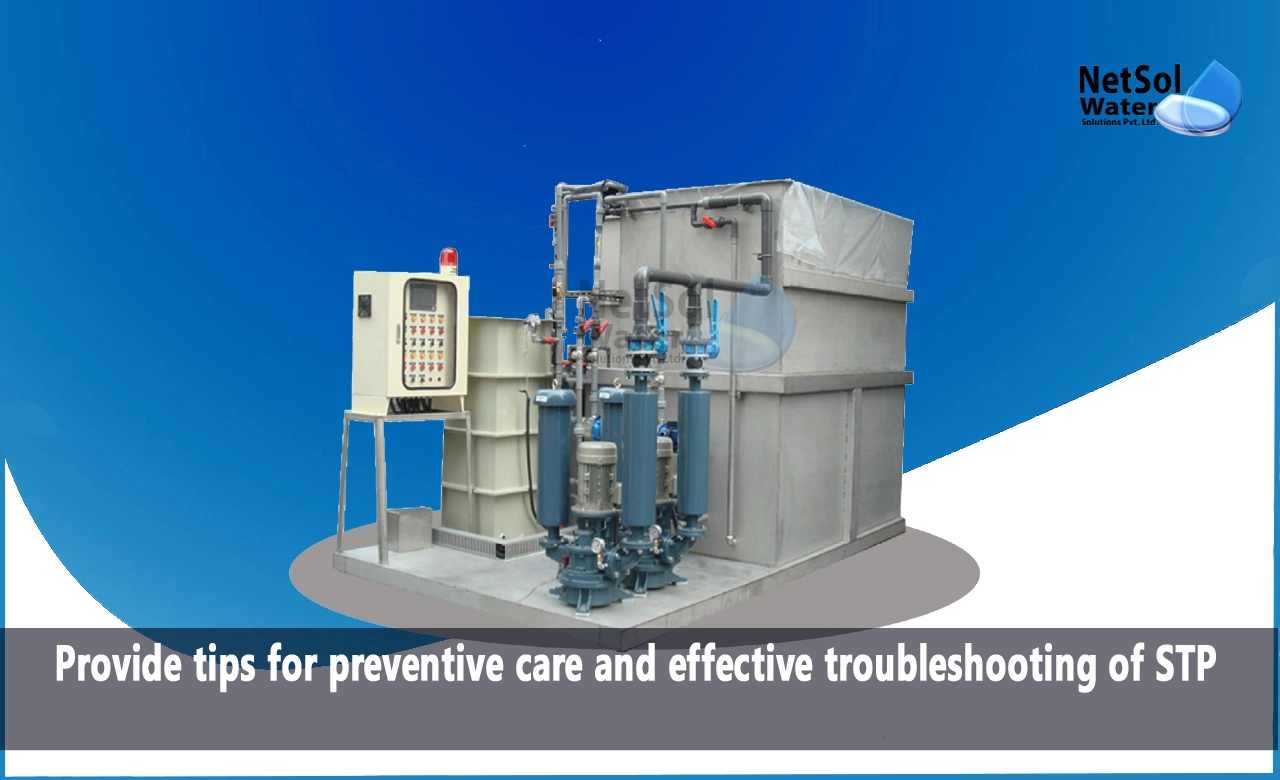Provide tips for preventive care and effective troubleshooting of STP
Proper maintenance of sewage treatment plants (STPs) is crucial for their efficient and reliable operation. Regular preventive care and troubleshooting can help identify and address issues before they escalate, ensuring the smooth functioning of the plant.
Here we will see the importance of STP maintenance and provides essential tips for preventive care and effective troubleshooting.
The Significance of STP Maintenance
STP maintenance has a lot of significance. These are enumerated below:
1. Optimal Performance:
Regular maintenance maximizes the performance of STPs by ensuring that all components, equipment, and processes are functioning at their best. It helps maintain efficient treatment, minimize operational disruptions, and reduce the risk of system failures.
2. Longevity of Infrastructure:
Timely maintenance extends the lifespan of STP infrastructure, including pumps, motors, valves, and tanks. It prevents premature wear and tear, corrosion, and deterioration, saving costs associated with major repairs or replacements.
3. Compliance and Environmental Protection:
Proper maintenance ensures that STPs comply with regulatory standards for effluent quality and environmental protection. It prevents potential pollution incidents and safeguards water bodies and ecosystems.
Tips for Preventive Care
The preventative care for maintenance of STP can be done by following tips:
1. Regular Inspections:
Conduct routine inspections of the entire STP, including tanks, pipelines, pumps, and control systems. Look for signs of corrosion, leaks, blockages, or any abnormality. Address minor issues promptly to prevent them from escalating.
2. Cleaning and Debris Removal:
Regularly clean tanks, screens, and filters to prevent clogging and maintain optimal flow. Remove debris, grease, and sediment that may accumulate in various components, such as grit chambers and clarifiers.
3. Equipment Lubrication:
Follow manufacturer guidelines for lubrication of pumps, motors, and other mechanical equipment. Proper lubrication reduces friction, extends equipment life, and improves efficiency.
4. Calibration and Testing:
Regularly calibrate and test instruments, such as pH meters, flow meters, and level sensors, to ensure accurate measurements. Calibration helps maintain precise control of treatment processes and enables early detection of deviations.
5. Spare Parts Inventory:
Maintain an inventory of critical spare parts to minimize downtime in case of equipment failure. Identify the most essential components and ensure they are readily available.
Effective Troubleshooting Techniques
Some effective techniques for effective troubleshooting with regarding to STPs are as follows:
1. Diagnostic Tools:
Invest in diagnostic tools, such as data loggers and remote monitoring systems, to track performance parameters and identify deviations or anomalies. These tools provide valuable insights for troubleshooting and proactive maintenance.
2. Root Cause Analysis:
When issues arise, conduct a systematic root cause analysis to identify the underlying reasons. Address the root causes rather than just treating the symptoms to prevent recurring problems.
3. Collaboration with Experts:
Seek assistance from specialists or equipment manufacturers when facing complex issues or technical challenges. Their expertise and experience can help diagnose and resolve problems effectively.
4. Documentation and Reporting:
Maintain a comprehensive maintenance log and record all activities, inspections, repairs, and troubleshooting efforts. This documentation serves as a valuable resource for future reference and assists in identifying recurring issues.
5. Staff Training:
Provide regular training to STP operators and maintenance personnel on troubleshooting techniques, equipment operation, and safety protocols. Well-trained staff can quickly identify and resolve problems, minimizing downtime.
Summary:
Sewage treatment plant maintenance is essential for the optimal performance, longevity, and compliance of STPs. By implementing preventive care measures such as regular inspections, cleaning, lubrication, calibration, and maintaining spare parts inventory, potential issues can be identified and addressed proactively. Effective troubleshooting techniques, including root cause analysis, collaboration with experts, and documentation, further contribute to maintaining the smooth operation of the STP. A proactive approach to STP maintenance ensures efficient wastewater treatment, minimizes disruptions, and protects the environment for the long term.
Leading manufacturer of sewage treatment plants in India.
Netsol Water is the leading manufacturer, supplier, and exporter of a quality selection of water treatment, and wastewater treatment products in India, by using advanced sewage treatment methods.
RO plants, water softeners, ETPs, STPs, DM plants, AMC, O&M, Ultra filtration, UV, Ozonation, ZLD plants, Anoxic tanks, and other goods and services are available from us. We also provide services to businesses in sectors including automotive, pharmaceutical, textile, pulp & paper, beverages, refineries, schools, hospitals, office buildings, and hotels, among others.
Netsol Water is Greater Noida-based leading water & wastewater treatment plant manufacturer. We are industry's most demanding company based on client review and work quality. We are known as best commercial RO plant manufacturers, industrial RO plant manufacturer, sewage treatment plant manufacturer, Water Softener Plant Manufacturers and effluent treatment plant manufacturers. Apart from this 24x7 customer support is our USP. Call on +91-9650608473, or write us at enquiry@netsolwater.com for any support, inquiry or product-purchase related query.



